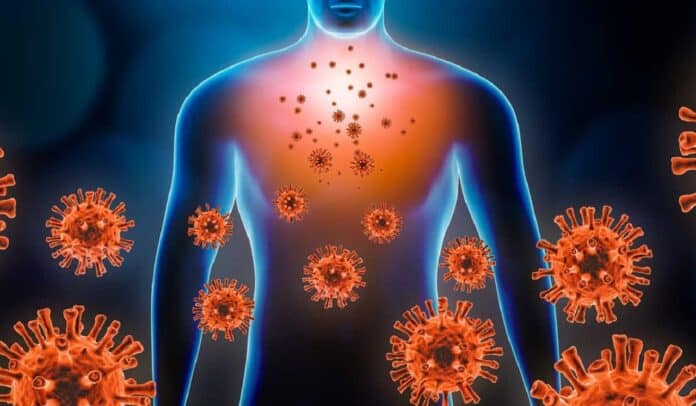In the last three years, the severe acute respiratory syndrome coronavirus 2 (SARS-CoV-2) that causes coronavirus disease 2019 (COVID-19) has proven to be a very contagious and deadly threat to human health.
Researchers at Washington University School of Medicine in St. Louis have found specific proteins that may help identify which patients would need to be ventilated and which may die due to the virus.
Principal investigator Carlos Cruchaga, director of the NeuroGenomics and Informatics Center at the School of Medicine, said, “Identifying harmful proteins may be helpful as we confront not only variants of the virus that causes COVID-19 but also as new viruses emerge in the future. We may be able to draw blood from an individual with a COVID infection, check the levels of these key proteins, and quickly determine the risk for serious outcomes. We then could use that information to determine the best course of treatment.”
They compared plasma samples from 332 COVID-19 patients hospitalized at Barnes-Jewish Hospital to plasma samples from 150 people who had not been infected with the virus that causes COVID-19, SARS-CoV-2. Because the samples were collected when patients were admitted to the hospital, the proteins associated with poorer COVID-19 outcomes were found long before patients were placed on ventilators or died from the virus.
The researchers used a technique known as high-throughput proteomics to discover protein overexpression and underexpression, commonly known as dysregulation, in blood plasma. The scientists performed additional testing to identify which of the proteins caused severe disease from those that became dysregulated due to severe illness.
The research team found a huge number of proteins that were changed in COVID-19 patients. They concluded that any of the 32 proteins that were dysregulated during COVID infection indicated that patients would require ventilator-assisted breathing. They discovered five more proteins that, when confirmed to be changed in blood plasma as a result of the virus, indicated the patient’s chance of death.
He said, “Many of the proteins we identified were related to inflammation and the body’s immune response, for example, so it wasn’t surprising to find them altered by COVID infection. But a subset of these proteins raised the likelihood that patients would need ventilation or go on to die. Using these proteomics approaches, we now have a methodology that allows us to predict problems, which can be very important for clinical practice.”
The researchers discovered that 332 COVID-19 patients investigated had any of 32 dysregulated proteins that suggested they needed ventilation to breathe, and only those with abnormalities in five proteins linked to severe disease died from infection.
The researchers examined identical proteomics data from 297 patients and 76 controls at Massachusetts General Hospital in Boston to further test their findings. They discovered that the same proteins predicted the ultimate need for ventilators and the chance of mortality in both groups of patients.
The researcher said.” The study involved blood plasma from patients hospitalized during the initial surge of patients with COVID-19, so it’s unclear whether precisely the same proteins would lead to ventilation and death from infection with later variants of the virus. However, the same high-throughput proteomics approach could likely be used to validate or identify suspect proteins in other variants. The strategy may even be useful with completely different viruses.”
According to the study, COVID-19 can raise the risk for coronary artery disease and Alzheimer’s disease because some of the proteins that were dysregulated after infection with COVID-19 were connected to these diseases’ pathways.
He said, “That was a surprising finding because this project was not focused on those issues. Some of the proteins we identified are causal proteins in Alzheimer’s pathology. Others are used as biomarkers for Alzheimer’s disease in the blood and cerebrospinal fluid. COVID infection altered the levels of those biomarkers to the point where if someone was to go to the clinic for a blood test, the neurologist might even diagnose that patient as having Alzheimer’s disease, when in fact, what the blood test is revealing is that the patient recently had COVID-19. This is a good example of how high-throughput approaches will help us understand that COVID is a disease affecting the lungs, the brain, and the heart.”
Cruchaga stated that by examining these proteins in blood plasma, it might be possible to identify those most likely to have specific symptoms after contracting COVID. This work also provides a biological basis for understanding some of the symptoms connected to the condition.
He said, “Although fewer people are dying from COVID-19 these days, its impact on memory in people who are cognitively normal and disease progression in people who already have cognitive problems is of concern.”
The National Institutes of Health’s National Center for Advancing Translational Sciences, the National Cancer Institute, and the National Institute on Aging all funded the study.
Journal Reference:
- Lihua Wang,Carlos Cruchaga, etal.Plasma proteomics of SARS-CoV-2 infection and severity reveals impact on Alzheimer’s and coronary disease pathways. iScience. DOI: 10.1016/j.isci.2023.106408
